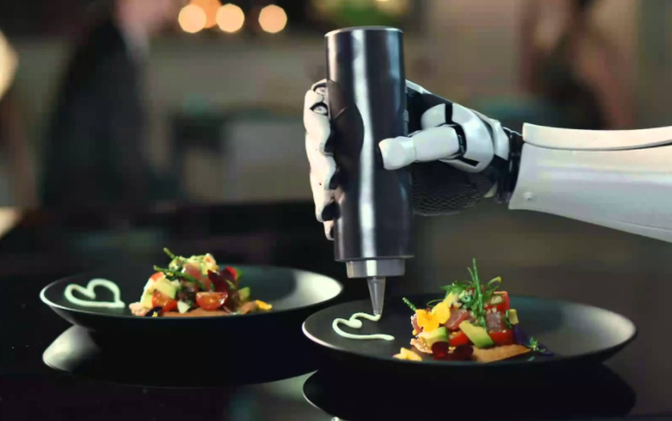Author Tim Dunlop says the rise of automation will cause massive changes to the world economy. He speaks to Scout about what it means for the hospitality industry and its employees.

With the rise of an “automated economy”, 47 per cent of today’s jobs are at high risk of being obsolete when a child born in 2016 graduates from university.
At first look, most jobs in our thriving hospitality industry would appear to be immune – it’s hard to imagine robots capable of preparing six-course degustation menus or pouring our wines. Hospitality is part of the service industry, after all. And service does require, well, service. But according to Australian writer and futurist Tim Dunlop, we should think again.
In his recent book, Why the Future is Workless, Dunlop explores the possible ramifications of machines on the workforce and doesn’t discount any industries from being affected.
“The hospitality industry is just as prone to automation as any other,” he says. “The rule of thumb is that if you can write down the rules for a job, a robot can do it. And there are plenty jobs in hospitality that would apply for. Most chefs for example, follow recipes, which are basically rules.”
Robot cooks already exist. US start-up Momentum machines has created a robot that can produce 400 burgers in an hour (three times quicker than a human). And robotics businesses Moley has created a robotic kitchen that can make up to 2500 menu dishes, operated like iTunes.
So should the hospitality industry start worrying? Dunlop says not for the time being, but “they should be certainly be mindful.”
“What’s essentially stopping robots taking over in the short term are three bottlenecks: creativity, sociability and the ability to work in complex unstructured working environments.
“So the actual creative part of cooking, dreaming up new dishes, and experimenting with flavours will still be a human skill for the immediate future. And clearing tables in a busy restaurant is also beyond their capabilities at this stage, so waiting work won’t be going anywhere too soon.
“But these bottlenecks are rapidly being transcended. Robots are becoming smarter, and what’s stopping them now won’t last forever.”
A number of recent technological advancements have already started making a dent in these barriers.
Amazon has designed warehouse robots that can successfully interact in unstructured environments. Google’s AI group “Brain” has built a bot that can create its own music. And US healthcare companies have created robot therapists, which have shown to be as effective as the real thing.
Mass production and industry application of these technologies is no doubt way off, but they have planted the seeds to what Dunlop believes to be the future.
‘The industry is going to see massive changes,” Dunlop says. “Once machines become cheaper than workers, they will replace them. Restaurant owners will do so to be competitive.
“Humans won’t disappear completely, but the jobs left for them are likely to be either the really low paid, low skilled sort, or the really high paid, high skilled sort, without much in between.
“The possibilities are really endless,” he says. “From sushi-train type systems to humanoid robot waiters, or imagine an atrium-like design with the kitchens at the top level and the tables on the lower levels with drones flying around delivering food directly to tables.”

The key factor here is not about whether industry players will utilise new technologies, but whether consumers will accept them.
“Look what happened with service stations 40 years ago when self-serve was introduced: some garages continued to offer human service but they just couldn’t compete on price and people weren’t willing to pay,” Dunlop says.
“I’m sure there will be top-end restaurants where human service is part of the deal and people will pay for the experience, but who cares if a schoolkid hands you your meal or if it’s dispensed by a machine?”
“Get as highly skilled as possible by building your creativity and originality, and learn how to manage people and solve problems,” Dunlop advises.
“The more of these [human interaction] skills you can develop, the more likely you are not to be replaced by technology of some sort, in the foreseeable future.”
Dunlop also advises to “get political”.
“Change is coming and if we want it to affect us in a positive way, we have to control the way it is implemented. So start demanding politicians build a world where you can pursue a passion for cooking, or whatever else, without it having to be a paying job.”
Dunlop sees potential in the idea of a universal income, a form of social security where all citizens are given a basic wage on an unconditional basis.
“If robots take most of the jobs, but we can figure out how to distribute wealth fairly by something other than wages, we might actually end up with a world where most of the stuff we need is produced by automation, and that will leave us free to get on with the things we love doing. At the end of the day, the future of work is a political issue, not a technological one.”
Tim Dunlop is the author of The New Front Page: New Media and the Rise of the Audience (2013), Why the Future is Workless (2016) and two popular Australian political blogs, The Road to Surfdom and Blogocracy. He also writes a regular column for ABC’s The Drum and teaches at the Centre for Advancing Journalism at The University of Melbourne.



